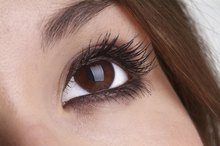What Causes Hair to Become Dry & Brittle?
Dry, brittle hair has many causes, some of which can be serious. Most of the time, brittle hair is nothing more than a nuisance brought on by neglect and too many chemical services. However, several serious diseases and conditions cause dry, brittle hair. For this reason, every new case of brittle hair should be evaluated by a medical professional if the exact cause is unknown.
Nutrition
Poor nutrition and diets lacking in protein and vitamins can cause hair to become dry and brittle. Eating too much fat and sugar will not affect your hair unless you eat fat and sugar exclusively. A diet must include proteins, vitamins and plenty of water to keep hair healthy 3.
A body that is malnourished due to an eating disorder, illness or lack of food cannot grow healthy hair because it does not possess the nutrients and building blocks necessary to construct strong hair 3. Not only does hair become dry and brittle under these conditions, it also can fall out.
- Poor nutrition and diets lacking in protein and vitamins can cause hair to become dry and brittle.
Illness
What Causes Excess Hair to Fall Out While Brushing?
Learn More
Thyroid disease, Graves disease (an autoimmune disease that affects the thyroid) and hormonal imbalances commonly cause symptoms of dry and brittle hair. Interestingly, all of the diseases and disorders that cause dry, brittle hair are similar to each other as they all affect hormonal levels, which in turn affects hair strength and growth. Most illnesses can be traced back to the thyroid as well, making thyroid diseases and disorders the most common illnesses that cause dry, brittle hair.
- Thyroid disease, Graves disease (an autoimmune disease that affects the thyroid) and hormonal imbalances commonly cause symptoms of dry and brittle hair.
- Most illnesses can be traced back to the thyroid as well, making thyroid diseases and disorders the most common illnesses that cause dry, brittle hair.
Medical Treatment
Certain medications and medical treatments dramatically and negatively affect hair. Some medications used to treat cardiovascular disease, high cholesterol, eczema, psoriasis, hepatitis and diabetes list dry, brittle hair as a side effect. Medical treatments for major illnesses, surgery, transplants and gastrointestinal bypasses also cause brittle hair.
- Certain medications and medical treatments dramatically and negatively affect hair.
- Medical treatments for major illnesses, surgery, transplants and gastrointestinal bypasses also cause brittle hair.
Chemical Services
How to Restore Hair Elasticity
Learn More
Chemical services lift the protective, cuticle layer of the hair to penetrate the middle, cortex layer. The cortex layer contains structures that determine the strength, color and texture of the hair. Chemical services alter these structures to change the appearance of the hair. Repeated chemical treatments undermine the strength and integrity of the hair structure, causing the hair to become dry and brittle.
- Chemical services lift the protective, cuticle layer of the hair to penetrate the middle, cortex layer.
- Chemical services alter these structures to change the appearance of the hair.
Abuse and Neglect
Styling abuse and improper care wreak havoc on healthy hair. Every day styling strips hair of protective oils and ruffles the cuticle layer of the hair. Haircuts, conditioning treatments, protective styling products and restorative shampoos and conditioners normally counteract and reverse styling damage. If regular maintenance is neglected, however, damage gradually worsens until the structural integrity of the hair breaks down.
- Styling abuse and improper care wreak havoc on healthy hair.
- If regular maintenance is neglected, however, damage gradually worsens until the structural integrity of the hair breaks down.
Related Articles
References
- The New York Times: Health Guide: Dry Hair
- Mail Online: How to Eat your Way to Healthy Hair
- CNN: The Guide to Healthy Hair
- Go Ask Alice: Hair Condition: Oily or Dry? |
- Phillips TG, Slomiany WP, Allison R. Hair Loss: Common Causes and Treatment. Am Fam Physician. 2017;96(6):371-378.
- Watras MM, Patel JP, Arya R. Traditional anticoagulants and hair loss: a role for direct oral anticoagulants? A review of the literature. Drugs Real World Outcomes. 2016;3(1):1-6. doi:10.1007/s40801-015-0056-z
- Urysiak-czubatka I, Kmieć ML, Broniarczyk-dyła G. Assessment of the usefulness of dihydrotestosterone in the diagnostics of patients with androgenetic alopecia. Postepy Dermatol Alergol. 2014;31(4):207-15. doi:10.5114/pdia.2014.40925
- Vincent M, Yogiraj K. A descriptive study of alopecia patterns and their relation to thyroid dysfunction. Int J Trichology. 2013;5(1):57-60. doi:10.4103/0974-7753.114701
- Peters EMJ, Müller Y, Snaga W, et al. Hair and stress: A pilot study of hair and cytokine balance alteration in healthy young women under major exam stress. PLoS ONE. 2017;12(4):e0175904. doi:10.1371/journal.pone.0175904
- Pratt CH, King LE, Messenger AG, Christiano AM, Sundberg JP. Alopecia areata. Nat Rev Dis Primers. 2017;3:17011. doi:10.1038/nrdp.2017.11
- American Academy of Dermatology. Alopecia Areata: Overview.
Writer Bio
Kathy Mayse began her writing career as a reporter for "The Jackson-County Times Journal" in 2001. She was promoted to assistant editor shortly after. Since 2005, she has been busy as a successful freelancer specializing in Web content. Mayse is a licensed cosmetologist with more than 17 years of salon experience; most of her writing projects reflect this experience.









